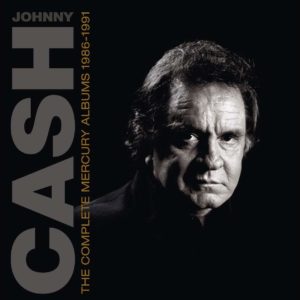Johnny Cash
A Night To Remember, 1973 — Live at the Ahmanson Theatre, Los Angeles
THIRD MAN
+
The Complete Mercury Recordings (1986-1991)
MERCURY NASHVILLE
8/10
It’s an easy mistake we make, thinking we know Johnny Cash—the bass-baritone voice and its coolly restrained Biblical force, the “Man in Black” imagery, the elegant beauty of that which he wrote, and that which he interpreted. With all that to contend with, our attention has been given to the jailhouse concert–giving Cash (the chugging countryman of “Folsom Prison Blues”), and the latter-day Cash: his dark-clouded, sparsely arranged, whisper-in-the-wind soliloquies.
Two new projects, however, pull the curtain back on missed moments, eras of Cash once considered minor. There’s the post-weekly television Cash of the early- to mid-1970s, where his popularity within country music began to dip (making commercials for Amoco and STP didn’t help—advertising and music’s stars were meant to be enemies, plus we were in an energy crisis). Then there’s the Cash of the ’80s—adrift from his label of decades, Columbia, due to sagging sales, and on to newer sounds and labels, including Mercury.
Third Man Records’ vinyl excavation of A Night To Remember 1973 — Live at the Ahmanson Theatre, Los Angeles, and the CD or vinyl box set collection The Complete Mercury Recordings 1986-1991, both prick up your ears.
As a continuation of Forever Words—the multi-year project by John Carter Cash in his search for unreleased musical gems, poems, prose, and lyrics—A Night to Remember finds a quavering, full-voiced Cash at his most robust, and his cocksure band at their full-throttle, skiffle-driven toughest. Starting with a hiccuping “Big River” from Roger Miller, the live-in-LA recording pushes through a fast-chugging medley so rockabilly fast you’re expecting Cash’s drummer to derail the proceedings.
There’s the jingle-jangle twang (with a hint of Larry Butler’s honky tonk piano) of “Sunday Morning Coming Down,” a talky, melodic “The City of New Orleans” rocking to a gentle beat, a ball-and-chain bluesy “Going to Memphis,” with a prickly sting guitar from Carl Perkins, a gutsy, gut-punched, rapid-fire “Boy Named Sue” that finds Cash celebrating his own son, John Carter—a “real jewel.” Most poignant, though, are the duets with his wife, June Carter Cash, such as the torrid, growly “Jackson” and “Help Me.” As a collective live show, this night in Los Angeles is hotter than a pepper sprout.
As country in the mid-’80s went through the growing pains of contending with glossy pop and the rise of crossover commodification, the production on Cash’s Mercury albums is also sleeker than usual—certainly slicker than his Columbia label output. While derided then by country purists, the production of the Mercury Years’ silk-and-steel tones lend the stoically sing-song-y Cash—as singer of his own curt classics, or those of a handful of celebrated songwriters, past and (then) present—a crisp snap-crackle-and-pop. Take for instance “The Big Light” and “W. Lee O’Daniel (and the Light Crust Dough Boys)” from 1987’s Johnny Cash Is Coming to Town. Cash’s slippery snake scowl is given a brassy introduction on the former and a sprightly country swing on the latter.
Going back to “The Big Light” for a second—that track and the tender-hearted “Hidden Shame” (from 1990’s Boom Chicka Boom) were written by Elvis Costello. With U2 by his side, Cash performs Bono/The Edge’s “The Wanderer” accompanied by the era-appropriate electro bug-buzz on 1991’s The Mystery of Life. Producer-guitarist Dave Edmunds also appears singing as part of “Big Train from Memphis” from Cash’s first album for Mercury, Class of ’55: Memphis Rock & Roll Homecoming.
The songs are solid, and Cash’s low, haunted voice is pushed high in the mix for that ultimate, friendlier ’80s/’90s experience (you won’t mistake his hit-rerecording effort for Mercury, 1988’s Classic Cash and its griddle hot takes for the Texi-Cali “Ring of Fire” or the gospel-ish “I Still Miss Someone,” or the forlorn folksy Ballad of Ira Hayes with their originals). Yet the boldest part of Cash’s working with Costello, Bono, and Edmunds then seems something of a blueprint for what was to follow in their immediate wake, a primer for Rick Rubin’s series of American label recordings teaming Cash with Trent Reznor, Glenn Danzig, Tom Waits, and Nicks Cave and Lowe starting in 1994.
Beyond that youthful zest and a clever nod to (or from) rock’s newer wave, Cash’s time with Mercury also found him reuniting with old friends from the start of his career, as heard on Class of ’55 and its charming reunion of Sun Records giants Jerry Lee Lewis, Roy Orbison, Carl Perkins, and producer Chips Moman for a tribute to the past that’s better than it had any right to be. Even 1988’s kinda-corny duets album Water from the Wells of Home (Paul McCartney? Really?) and the flossily reminiscent “Johnny Cash Is Coming to Town,” reteaming Cash with his ’50s sessions producer “Cowboy” Jack Clement, are warmer and more wonderful now, in the bold embrace of bright production and opulent melodies, than originally remembered; a sentiment that goes for the whole of Cash’s delectable Mercury years.







